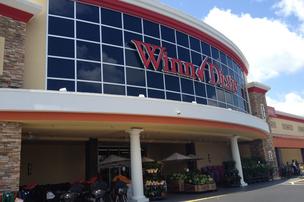As Winn-Dixie is said to eye bankruptcy, retail landlords throughout Florida brace for impact
February 27th, 2018
One of Florida’s largest grocers is reportedly on the brink of bankruptcy, potentially leaving retail landlords throughout the Southeast with massive empty anchor boxes at a time when most retailers are shrinking their physical footprints.
Southeastern Grocers LLC — the Jacksonville-based parent company of Winn-Dixie — has been asking landlords in recent months to lower its lease payments, which is often a sign that a company is struggling, real estate sources in Tampa, Orlando and Jacksonville have told the Business Journal.
Anonymous sources told Bloomberg on Saturday the company could file for bankruptcy as soon as March. SEG, which also operates Harveys, Bi-Lo and Fresco y Mas stores, is burdened by more than a billion dollars in debt coming due in 2018 and 2019. In November, Moody’s downgraded the company’s bonds, saying that although operating metrics had improved, “the current capital structure is unsustainable.”
This would be the third iteration of Winn-Dixie to face bankruptcy; previous corporate entities went through bankruptcy in 2005 and 2009.
SEG’s potential bankruptcy, a topic of speculation for months, would have a ripple effect on jobs and real estate across the Southeast. The grocer could close up to 200 stores, according to a source in the Florida commercial real estate community. The company has around 700 stores and 50,000 employees in a seven-state footprint — Florida, Georgia, Alabama, Louisiana, Mississippi and the Carolinas.
“Southeastern Grocers is undertaking an ongoing strategic review in advance of our unsecured bond maturity later this year,” spokesman Joe Caldwell wrote in an email Sunday. “The company’s business operations continue to be strong, as we serve our customers with quality and commitment by working seamlessly with our business partners every day. We are dedicated to being a great place for associates to work and a great place for our customers to shop by providing quality, service and value in the communities we serve.”
• • •
If Winn-Dixie does shutter up to 200 stores, it could leave some retail property owners in a pinch. The average size of a Winn-Dixie store is 47,640 square feet, according to GroceryAnchored.com.
The average within the Bi-Lo banner is 41,348 square feet; Fresco y Mas, SEG’s Hispanic-focused concept that’s in the Miami-Dade area, averages 47,533. Harveys stores are a bit smaller, at 34,500 square feet. Across SEG’s 700 stores, the average size is 44,711 square feet — and there are very few retailers of that size looking for new locations.
Sprouts Farmers Market Inc., which has been opening new stores in Central Florida, occupies around 30,000 square feet. Publix Super Markets Inc. has dozens of prototypes meant to accommodate a number of real estate scenarios — ranging from 28,000 to 60,000 square feet — but the company in recent years has focused on stores at the smaller end of that spectrum.
With so few tenants interested in such large boxes, landlords will be forced to redevelop their properties to entice businesses that are looking at shopping centers.
• • •
One possible outcome of filing for bankruptcy protection is that the company could be sold, but there are far fewer potential buyers for a middle-market grocery chain than there were in 2011, when Winn-Dixie merged with Bi-Lo LLC in a $560 million deal.
Kroger Co., long speculated to be plotting its entrance into Florida, seems focused on acquisitions that accelerate its e-commerce growth. Lakeland-based Publix, one of Winn-Dixie’s biggest competitors, typically cherry-picks store acquisitions, as opposed to buying entire other companies wholesale.
Grocery has always been a hyper competitive industry, one built on razor-thin margins, and the stakes have never been higher than in 2018. Amazon.com, through its acquisition of Whole Foods Market, is poised to shake up a business model that’s been relatively unchanged for decades.
In the Central Florida region, for example, Winn-Dixie has 15 stores, while Publix has about 141.
“Having been involved in Jacksonville bankruptcy court during the first filing, these issues do sound very reminiscent of when they filed Chapter 11 previously,” said Ken Jacobs, managing partner of GrayRobinson’s Jacksonville office.
Source: SouthFloridaBusinessJournal


Leave a Comment